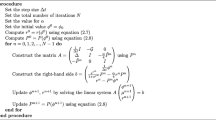Abstract
The general extremum theory essentially uses properties of operator derivatives. As an example we consider a system described by a nonlinear elliptic equation. In this system with large values of the nonlinearity parameter and the domain dimension the control-state mapping is not Gâteaux differentiable. For this reason one cannot immediately differentiate the optimality criterion and establish the necessary optimality conditions by classical methods. However the mentioned mapping is extendedly differentiable. This allows one to obtain optimality conditions imposing no constraints on system parameters. Concluding the paper, we interpret the optimality conditions with classical and extended derivatives within the theory of categories.
Similar content being viewed by others
References
A. D. Dubovitskii and A. A. Milyutin, “Extremum Problems with Constraints,” Zhurn. Vychisl. Matem. i Matem. Fiz. 5(3), 395–453 (1965).
L. W. Neustadt, “An Abstract Variational Theory with Application to a Broad Class of Optimization Problems, I,” SIAM J. Control and Optim., No. 4, 505–527 (1966).
L. W. Neustadt, “An Abstract Variational Theory with Application to a Broad Class of Optimization Problems, II,” SIAM J. Control and Optim., No. 1, 90–137 (1967).
A. D. Ioffe and V. M. Tikhomirov, Theory of Extremal Problems (Nauka, Moscow, 1974) [in Russian].
A. V. Dmitruk, A. A. Milyutin, and N. P. Osmolovskii, “Lyusternik’s Theorem and the Theory of Extrema,” Usp. Mat. Nauk 35(6), 11–46 (1980).
J.-P. Aubin and I. Ekeland, Applied Nonlinear Analysis (Wiley-Interscience, Berlin, 1984; Mir, Moscow, 1988).
J.-L. Lions, Optimal Control of Systems Governed by Partial Differential Equations (Springer, New York, 1971; Mir,Moscow, 1972).
J.-L. Lions, QuelquesMéthodes de Résolution des Problémes aux Limites non Linéaires (Dunod, Paris, 1969; Mir, Moscow, 1972).
A. V. Fursikov, Optimal Control of Distributed Systems. Theory and Applications (Nauchnaya Kniga, Novosibirsk, 1999) [in Russian].
V. I. Ivanenko and V. S. Mel’nik, VariationalMethods in Control Problems for Systems with Distributed Parameters (Naukova Dumka, Kiev, 1988) [in Russian].
U. E. Raitum, Problems of Optimal Control for Elliptic Equations (Zinatne, Riga, 1989) [in Russian].
M. K. Leblebicioglu and A. O. Celebi, “An Optimal Control Problem with Nonlinear Elliptic State Equations,” J. Math. Anal. Appl. 163(1), 178–205 (1992).
J. J. Alibert and J. P. Raymond, “Boundary Control of Semilinear Elliptic Equations with Discontinuous Leading Coefficients and Unbounded Control,” Num. Funct. Anal. Optim. 18(3–4), 235–250 (1997).
E. Casas, F. Troltzsch, and A. Unger, “Second Order Sufficient Optimality Conditions for Some State-Constrainted Control Problems of Semilinear Elliptic Equations,” SIAM J. Contr. AndOptim. 38(5), 1369–1381 (2000).
J.-L. Lions, Contróle des Systémes Distribués Singuliers (Gautheir-Villars, Paris, 1983; Nauka, Moscow, 1987).
D. Tiba, Optimal Control of Nonsmooth Distributed Parameter Systems, Lecture Notes in Mathematics, Vol. 1459 (Springer Verlag, Berlin, 1990).
L. V. Kantorovich and G. P. Akilov, Functional Analysis (Nauka, Moscow, 1977) [in Russian].
S. Ya. Serovaiskii, “Calculation of Functional Gradients and Extended Differentiation of Operators,” J. of Inverse and Ill-Posed Problems 13(4), 383–396 (2005).
P. Neittaanmaki and D. Tiba, Optimal Control of Nonlinear Parabolic Systems. Theory, Algorithms, and Applications (Marcel Dekker, New York, 1994).
F. Clarke, Optimization and Nonsmooth Analysis (Wiley, New York, 1983; Nauka, Moscow, 1988).
S. Ya. Serovaiskii, “Differentiation of Inverse Functions in Spaces without Norm,” Funkts. Analiz i Prilozh. 27(4), 84–87 (1993).
S. Ya. Serovaiskii, “Inverse Function Theorem and Extended Differentiability in Banach Spaces,” Izv. Vyssh. Uchebn. Zaved. Mat., No. 8, 39–49 (1995) [Russian Mathematics (Iz. VUZ) 39 (8), 37–46 (1995)].
S. Ya. Serovaiskii, Optimization and Differentiation. Vol. 1: Minimization of Functionals. Stationary Systems (Print-S, Almaty, 2006) [in Russian].
I. Bucur and A. Deleanu, Introduction to the Theory of Categories and Functors (John Wiley, London, 1968; Mir,Moscow, 1972).
General Algebra, Ed. by L. A. Skornyakov, (Nauka, Moscow, 1977), Vol. 2 [in Russian].
A. I. Kukhtenko, “Categories and Topos Theory in Control Problems,”, in Slozh. Sistemy Upravl. (Kiev, 1989), pp. 4–15.
V. I. Yolkin, “On Categories and Foundations of the Theory of Nonlinear Control Dynamic Systems,” Differents. Uravn. 38(11), 1467–1482 (2002).
V. I. Averbukh and O. G. Smolyanov, “The Theory of Differentiation in Linear Topological Spaces,” Usp. Mat. Nauk 22(6), 201–260 (1967).
Author information
Authors and Affiliations
Corresponding author
Additional information
Original Russian Text © S.Ya. Serovaiskii, 2010, published in Izvestiya Vysshikh Uchebnykh Zavedenii. Matematika, 2010, No. 2, pp. 66–76.
About this article
Cite this article
Serovaiskii, S.Y. Differentiation of operators and optimality conditions in category interpretation. Russ Math. 54, 57–65 (2010). https://doi.org/10.3103/S1066369X10020076
Received:
Accepted:
Published:
Issue Date:
DOI: https://doi.org/10.3103/S1066369X10020076




